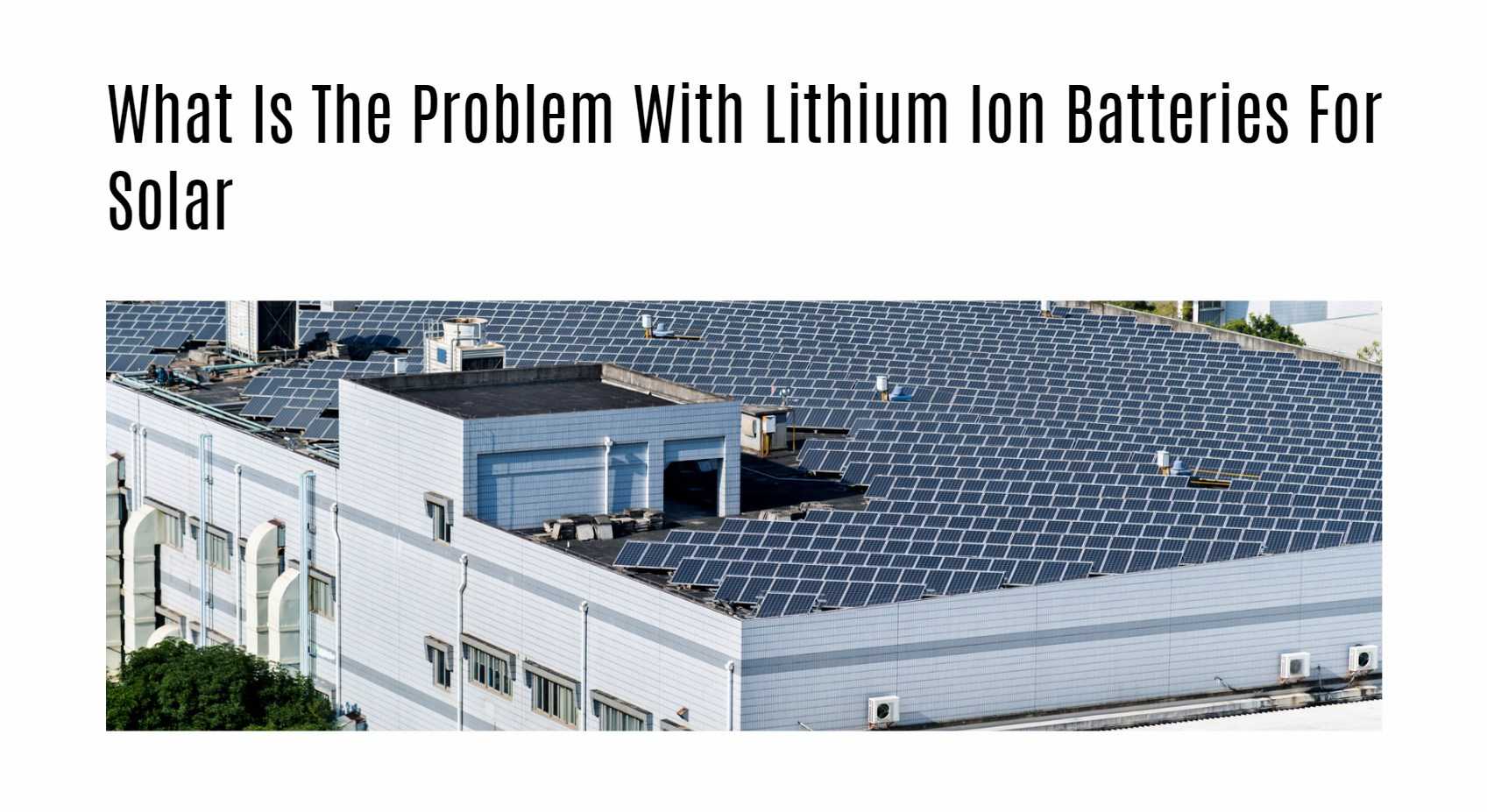Lithium-ion batteries have revolutionized the way we harness and store solar energy, offering a cleaner and more efficient alternative to traditional power sources. But are these sleek and powerful batteries all they’re cracked up to be? Let’s delve into the world of lithium-ion batteries for solar energy and uncover the potential pitfalls that come with this cutting-edge technology.
The Benefits of Using Lithium Ion Batteries for Solar Energy
Lithium ion batteries have revolutionized the way we store and utilize solar energy. One of the key benefits is their high energy density, which means they can store a significant amount of power in a compact size. This makes them ideal for residential and commercial solar installations where space may be limited.
Additionally, lithium ion batteries are known for their longevity and durability, making them a reliable choice for long-term energy storage solutions. They also have a fast charging capability, allowing users to quickly replenish their stored energy when needed.
Another advantage of lithium ion batteries is their efficiency in converting and storing solar energy. With minimal energy loss during charge and discharge cycles, they help maximize the overall effectiveness of a solar power system.
Furthermore, lithium ion batteries are low maintenance compared to other battery types, reducing operational costs over time. The benefits of using lithium ion batteries for solar energy make them an attractive option for those looking to harness renewable power efficiently and effectively.
The Potential Problems with Lithium Ion Batteries for Solar Energy
When it comes to using lithium-ion batteries for solar energy storage, there are a few potential problems that can arise. One of the main issues is the high cost associated with these batteries, making them less accessible for some homeowners or businesses looking to invest in solar power solutions.
Another concern is the limited lifespan of lithium-ion batteries, as they can degrade over time and require replacement sooner than expected. This not only adds to the overall cost but also contributes to electronic waste if not properly disposed of or recycled.
Additionally, safety risks such as overheating and potential fire hazards have been reported with lithium-ion batteries, emphasizing the importance of proper installation and maintenance protocols. The reliance on rare earth minerals for manufacturing these batteries also raises environmental sustainability concerns due to mining practices and resource depletion.
Exploring alternative energy storage options like lead-acid or flow batteries could offer more affordable and environmentally friendly solutions for storing solar power efficiently. It’s essential for consumers and industry professionals alike to weigh the benefits against the drawbacks when considering lithium-ion batteries for solar energy applications.
Environmental Concerns and Risks Associated with Lithium Ion Batteries
When it comes to using lithium-ion batteries for solar energy storage, there are some environmental concerns and risks that need to be considered. One of the main issues is the mining of lithium, which can have negative impacts on local ecosystems and water sources. Additionally, the manufacturing process of these batteries can contribute to air and water pollution.
Furthermore, the disposal of lithium-ion batteries poses a challenge as they contain toxic materials that can leach into the environment if not properly recycled. This can lead to soil contamination and harm wildlife in surrounding areas. Inadequate recycling infrastructure also contributes to the problem as many batteries end up in landfills instead of being properly processed.
It’s important for consumers and manufacturers alike to be aware of these environmental risks associated with lithium-ion batteries and work towards more sustainable solutions for energy storage in the future.

Alternatives to Lithium Ion Batteries for Solar Energy Storage
Looking for alternatives to lithium ion batteries for solar energy storage? There are several options worth exploring. One popular alternative is lead-acid batteries, which have been used for decades in various applications. They are cost-effective and widely available, but they tend to have shorter lifespans compared to lithium ion batteries.
Another option is flow batteries, such as vanadium redox flow batteries. These offer scalability and long cycle life, making them suitable for large-scale solar energy storage systems. However, they can be expensive upfront and may require regular maintenance.
Alternatively, solid-state batteries are gaining attention as a promising alternative. These batteries use solid electrodes and electrolytes instead of liquid or gel components found in traditional lithium ion batteries. They offer improved safety and energy density but are still in the early stages of development.
Exploring alternatives to lithium ion batteries can help address some of the limitations associated with current solar energy storage technologies.
Solutions and Strategies to Address the Problematic Aspects of Lithium Ion Batteries for Solar
When it comes to tackling the challenges associated with lithium ion batteries for solar energy storage, there are several innovative solutions and strategies that can be implemented. One approach is to invest in research and development to enhance the longevity and efficiency of lithium ion batteries. By improving battery technology, we can address issues such as capacity degradation over time.
Another solution is to implement smart battery management systems that optimize charging and discharging cycles. These systems help prevent overcharging or deep discharging, which can extend the lifespan of lithium ion batteries significantly. Additionally, incorporating renewable energy sources like wind or hydroelectric power into the mix can reduce reliance on lithium ion batteries for solar energy storage.
Furthermore, recycling programs for lithium ion batteries can help minimize environmental impact by reusing valuable materials instead of disposing of them in landfills. By adopting a holistic approach that combines technological advancements with sustainable practices, we can effectively address the problematic aspects of using lithium ion batteries for solar energy storage.
Conclusion:
As the demand for renewable energy continues to grow, the importance of efficient energy storage solutions becomes increasingly evident. While lithium-ion batteries have revolutionized the solar energy industry by providing a reliable and long-lasting storage option, they are not without their drawbacks.
From potential safety hazards to environmental concerns surrounding mining and disposal, there are valid reasons to explore alternative options for storing solar energy. Technologies such as flow batteries, lead-acid batteries, and even emerging options like hydrogen fuel cells offer promising alternatives that may address some of the limitations of lithium-ion batteries.
By staying informed about the benefits and challenges associated with different energy storage technologies, we can make more sustainable choices for our solar power systems. With ongoing research and innovation in this field, we are hopeful that future advancements will help us overcome the current limitations of lithium-ion batteries and pave the way for a cleaner and more efficient renewable energy future.




